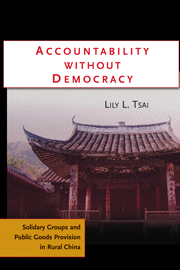Book contents
- Frontmatter
- Contents
- List of Figures
- List of Tables
- Acknowledgments
- 1 GOVERNANCE AND INFORMAL INSTITUTIONS OF ACCOUNTABILITY
- 2 DECENTRALIZATION AND LOCAL GOVERNMENTAL PERFORMANCE
- 3 LOCAL GOVERNMENTAL PERFORMANCE
- 4 INFORMAL ACCOUNTABILITY AND THE STRUCTURE OF SOLIDARY GROUPS
- 5 TEMPLES AND CHURCHES IN RURAL CHINA
- 6 LINEAGES AND LOCAL GOVERNANCE
- 7 ACCOUNTABILITY AND VILLAGE DEMOCRATIC REFORMS
- 8 THE LIMITATIONS OF FORMAL PARTY AND BUREAUCRATIC INSTITUTIONS
- 9 CONCLUSION
- References
- Appendix: Additional Notes on Survey Sampling and Data Analysis
- Index
- Cambridge Studies in Comparative Politics
4 - INFORMAL ACCOUNTABILITY AND THE STRUCTURE OF SOLIDARY GROUPS
Published online by Cambridge University Press: 05 June 2012
- Frontmatter
- Contents
- List of Figures
- List of Tables
- Acknowledgments
- 1 GOVERNANCE AND INFORMAL INSTITUTIONS OF ACCOUNTABILITY
- 2 DECENTRALIZATION AND LOCAL GOVERNMENTAL PERFORMANCE
- 3 LOCAL GOVERNMENTAL PERFORMANCE
- 4 INFORMAL ACCOUNTABILITY AND THE STRUCTURE OF SOLIDARY GROUPS
- 5 TEMPLES AND CHURCHES IN RURAL CHINA
- 6 LINEAGES AND LOCAL GOVERNANCE
- 7 ACCOUNTABILITY AND VILLAGE DEMOCRATIC REFORMS
- 8 THE LIMITATIONS OF FORMAL PARTY AND BUREAUCRATIC INSTITUTIONS
- 9 CONCLUSION
- References
- Appendix: Additional Notes on Survey Sampling and Data Analysis
- Index
- Cambridge Studies in Comparative Politics
Summary
Imagine the mayor of a small town in the United States with only one church. Church suppers and picnics are a major part of the town's social life, and the church hall might be the only place that people can rent or borrow for social gatherings. Even if not everyone goes to church regularly, everyone sees the church as representative of the town community. If the mayor does something exemplary such as bringing down the crime rate by strengthening the police force, the minister might very well mention his good work in front of the congregation during his Sunday sermon. Getting commended by the minister during services can give the mayor a measure of moral standing in addition to whatever status he might already possess as a public official or member of the social elite. The mayor benefits personally from this increased standing. People stop him on the street to praise his work, storekeepers treat him with more deference, the bank is more willing to give him a bigger mortgage, and his children receive more attention at school. Increased moral standing may also make his mayoral tasks easier to carry out. When he tries to implement a difficult state policy – a new requirement, for example, that students of a different ethnic group be bused into the town school – additional standing can help him elicit compliance from his constituents. Moral standing helps the local official by strengthening the belief of citizens in his good intentions.
- Type
- Chapter
- Information
- Accountability without DemocracySolidary Groups and Public Goods Provision in Rural China, pp. 86 - 119Publisher: Cambridge University PressPrint publication year: 2007
- 1
- Cited by



